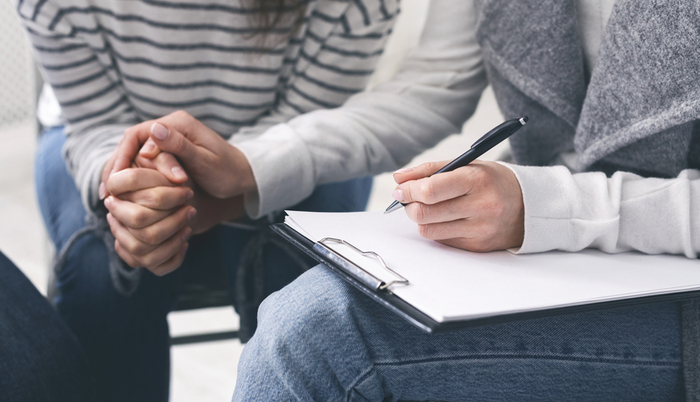- Calls to this hotline are currently being directed to Within Health, Fay or Eating Disorder Solutions
- Representatives are standing by 24/7 to help answer your questions
- All calls are confidential and HIPAA compliant
- There is no obligation or cost to call
- Eating Disorder Hope does not receive any commissions or fees dependent upon which provider you select
- Additional treatment providers are located on our directory or samhsa.gov
Veterans Affairs Eating Disorder Coverage
Mental health struggles among active duty service members and veterans of the United States military are an often talked-about subject. But when it comes to mental health conditions involving disordered eating behaviors, the conversation tends to suddenly go quiet.
Yet, some evidence suggests that more people should be talking about these types of mental health issues for service members.
A pair of recent studies found both that the lifestyle of active-duty military members can lead to eating disorders once they return to civilian life, and that homeless veterans had a 59% greater likelihood of experiencing an eating disorder than domiciled veterans. [1,2]
In many cases, other mental health conditions, such as post-traumatic stress disorder, play a major role for veteran patients, particularly women veterans or those with combat exposure. [3] These are just some of the reasons why Veterans Affairs eating disorder treatment is so important.
If you receive healthcare through the Department of Veterans Affairs (VA) or receive VA disability, you may have some questions about how this coverage can help you get treatment for an eating disorder.
Does the VA Cover Eating Disorder Treatment?
Yes, the Department of Veterans Affairs has various ways to assist veterans struggling with eating disorders. However, there are a series of conditions that must be met in order for the VA to cover various treatment options.
The three essential elements that you must show in order to access eating disorder treatment include: [4]
- An official eating disorder diagnosis
- That the condition developed during your military career (called an in-service illness, event, or injury)
- That there is a medical nexus between your eating disorder and military service
Each of these essential elements comes with its own set of definitions and caveats.
Current Diagnosis
This is probably the most straightforward element needed for VA help with mental health disorders.
In order to get eating disorder treatment, you must show that:
- Your disorder has been officially, medically diagnosed
and - You currently struggle with this condition
You will not be able to seek any kind of financial reimbursement or further services if you are not determined to be currently struggling with an eating disorder. For example, if a military veteran has previously experienced bulimia nervosa, but is no longer engaging in binging and purging behavior and has recovered to a healthy weight, the VA will not cover further treatment for the condition.
This also means that a registered mental health professional must write you an official diagnosis for a condition such anorexia nervosa, night eating syndrome, or an unspecified eating disorder.
While the VA does provide certain assessment and evaluation tools with specific diagnostic criteria, you may have to seek a diagnosis from a mental health professional outside of the VA before the VA will provide services.

In-Service Illness, Event, or Injury
This is where accessing care starts to get more difficult.
In order to have your eating disorder treatment covered, you must prove you developed disordered eating behaviors during your period of service.
Generally, this means presenting evidence of a documented event from the your military career or medical records that you can point to as a trigger. When it comes to mental health conditions, this usually means proving that you suffered some form of trauma while on active duty.
This event does not have to be connected to combat, however. And if the event is connected with or considered military sexual trauma (MST), the threshold of qualifying evidence may be lower. [5]
Medical Nexus
Finally, you must establish a connection between the in-service event you’re claiming triggered your disordered eating behaviors, and your current diagnosis.
While this sounds potentially tricky or complicated, it often involves a medical professional with specialized expertise making a statement on your behalf. [3]
The professional can be the same one who diagnosed you, but they must assert that, in their expert opinion, the event and the diagnosis are directly connected.
How Does VA Eating Disorder Coverage Work?
Once the three elements have been established, a VA examiner will assign your case a rating, which helps determine the type of compensation and health services you may receive.
For eating disorders, the ratings span from: [6]
- 0%
- 10%
- 30%
- 60%
- 100%
Roughly, these ratings correlate to the perceived severity of the condition.
Case Rating Meanings
Specifically, case ratings take certain factors into account, including the amount of self-induced weight loss you’ve experienced, and how many incapacitating episodes—or periods of time where bed rest and physician treatment was required—occurred.
Generally, the ratings mean that: [6]
- 100%: Self-induced weight loss was less than 80% of your minimum weight
- Incapacitating episodes totaled six weeks in a year
- Two instances of hospitalization, where tube feeding or other parenteral nutrition, was required
- 60%: Self-induced weight loss was less than 85% of your minimum weight
- Incapacitating episodes totaled six weeks in a year
- 30%: Self-induced weight loss was less than 85% of your minimum weight
- Incapacitating episodes totaled more than two weeks, but less than six weeks in a year
- 10%: An eating disorder has been diagnosed that features weight gain resistance
- Up to two weeks of incapacitating episodes in a year were experienced
- 0%: An eating disorder has been diagnosed, which features weight gain resistance, but there are no incapacitating episodes.
Once these eating disorder VA disability ratings have been established, the VA will begin to consider what type of treatment they will cover.
Compensation
For all disability cases, regardless of the particular mental or physical health condition involved, the VA pays a monthly stipend. Like the coverage you may be eligible for, this stipend is directly connected to your case rating.
For eating disorders, you can expect to be compensated: [7]
- 100% Disability Rating: $3,332.06 a month
- 60% Disability Rating: $1,214.03 a month
- 30% Disability Rating: $467.39 a month
- 10% Disability Rating: $152.64 a month
- 0% Disability Rating: $0.00 a month
These numbers represent basic estimations, but they can vary based on a number of factors, including the number of dependents you may claim. [7]
What Type of Eating Disorder Treatment Will the VA Cover?
When it comes to veterans eating disorders, as with nearly all other VA disability claims, the type of treatment available for coverage depends heavily on your case rating.
VA Health Care Priority Group 1
Any veteran with a disability rating of 50% or higher is placed in something called Priority Group 1. People with this designation receive different health care services, with no copay, at VA health care facilities.
Some of these services include: [8,9]
- Mental health care, including cognitive behavior therapy and other types of mental health programs
- Inpatient Services
- Hospitalization
- Reimbursement for medically-related travel expenses
- Rehab centers that meet proper certification requirements
If you are placed in Priority Group 1, the VA may also cover certain emergency hospitalization fees that are outside of the jurisdiction of its health insurance policy, TRICARE. [8]
Under 50%
If you receive a disability rating of under 50%, you may still be covered by VA facilities, but copays will be required.
If you have a qualifying eating disorder diagnosis, but a case rating of 0%, you may not receive monthly compensation, but the VA may cover your copayments for treatment.
What Does the VA Not Cover?
The VA only identifies two kinds of eating disorders: bulimia nervosa and anorexia nervosa. Any other type of eating disorder diagnosis will not be considered for a disability rating, and, therefore, not eligible for compensation or coverage. [10]
Even if diagnosed with a qualifying condition, you will still need to provide evidence of an in-service event or injury, and prove a connection between the event and your illness in order to qualify for coverage consideration.
This connection must be backed up by a board-certified psychologist or psychiatrist. If the connection cannot be found, the VA will not cover any treatments or necessary mental health services.

How to Start the VA Treatment Process
When dealing with an eating disorder, it can be difficult or frustrating to have additional healthcare hoops to jump through. Still, the VA’s process for coverage consideration is relatively straightforward.
You’ll need to:
- Receive a diagnosis of bulimia nervosa or anorexia nervosa from a board-certified physician
- Gather evidence of a qualifying in-service event
- Have your physician make the case for a connection between that event and your condition
- Find a VA treatment facility near you
- Have a VA examiner provide you with a rating
The process can be time-consuming, and reliving the trauma that has led to your difficulties may be a challenge, but once you have everything you need, the Department of Veterans Affairs can be a powerful tool in helping you recover from your eating disorder.
Resources
-
- Livingston, W.S., Brignone, E., Fargo, J.D., Gundlapalli, A.V., Maguen, S., Blais, R.K. (2018, August 6). VHA-Enrolled Homeless Veterans Are at Increased Risk for Eating Disorder Diagnoses. Military Medicine; 184(1-2):e71–e75.
- Cuthbert, K., Hardin, S., Zelkowitz, R., et al. (2020). Eating Disorders and Overweight/Obesity in Veterans: Prevalence, Risk Factors, and Treatment Considerations. Current Obesity Reports; 9:98-108.
- VA Disability Ratings for Eating Disorders. (2020, July 31). Chisholm, Chisholm & Kirkpatrick. Accessed January 2023.
- The 3 Essential Elements of Service Connection. (2023, January 31). Chisholm, Chisholm & Kirkpatrick. Accessed January 2023.
- Military Sexual Trauma (MST) VA Disability Claims Explained. (2022, January 19). Chisholm, Chisholm & Kirkpatrick. Accessed January 2023.
- VA Disability Ratings for Eating Disorders. (2020, July 31). Chisholm, Chisholm & Kirkpatrick. Accessed January 2023.
- 2022 VA Disability Pay Chart and Compensation Rates: Cost-of-Living Adjustment. (2022, August 29). Chisholm, Chisholm & Kirkpatrick. Accessed January 2023.
- 70% VA Disability Rating, Benefits, and Pay. (2022, October 7). Chisholm, Chisholm & Kirkpatrick. Accessed January 2023.
- Eating Disorder Treatment. TRICARE. Accessed January 2023.
- 38 CFR § 4.130 – Schedule of ratings – Mental disorders. Cornell Law School. Accessed January 2023.
Published on April 30, 2023 Published on EatingDisorderHope.com

